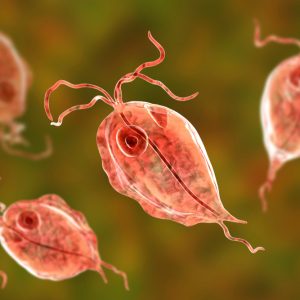Trichomoniasis
Trichomoniasis is a sexually transmitted infection (STI) caused by a parasite called Trichomonas vaginalis (TV), that causes an estimated 5 million new cases in the US each year.
The Native Antigen Company prepares Trichomonas antigens in cell culture, for use in immunoassay development.
Trichomonas Background
Trichomonas vaginalis is a flagellated parasitic protozoan, belonging to the Trichomonadidae family of parasites. Trichomonas is the causative agent of the sexually transmitted disease known as Trichomoniasis. Morphologically, Trichomonas exists as a trophozoite and cannot survive for long periods in the external environment. It is an obligate parasite that infects both men and women. The parasite infects the squamous epithelium of the genital tract, and replicates in the lower genital tract of women and the urethra and prostate of men (Kissinger, P).
In humans, Trichomonas is transmitted through skin-to skin contact, usually during sexual activity. Trichomonas infection is reported to be the most common, non-viral, sexually transmitted infection (STI) in the world. The prevalence of Trichomonas infection varies from country to country, but over 11% of women are thought to be affected worldwide. However, the Trichomonas is not a reportable disease and therefore the incidence of Trichomonas infection is likely higher. Studies also suggest that Trichomonas infection is associated with an increased risk of developing other STIs, including human immunodeficiency virus (HIV).
In both men and women, Trichomonas is typically asymptomatic. However, a third of asymptomatic cases in women can become symptomatic over a period of 6 months. Symptoms of Trichomonas infection include vaginal discharge, dysuria, itching, vulvar discharge and abdominal pain. Trichomonas infection has also been associated with pelvic inflammatory disease, low birth rate and preterm delivery. In men, Trichomonas infection can cause epididymitis, prostatitis and decreased sperm motility (CDC).
Improvements in diagnostic testing for Trichomonas may reveal a higher incidence of Trichomonas infection, which given the association with an increased risk of developing other STIs, is a significant cause for concern in the global health community.
References
- Kissinger P. 2015. Trichomonas vaginalis: a review of epidemiologic, clinical and treatment issues.BMC Infect Dis. Aug 5;15:307.
- Centers for Disease Control and Prevention: Trichomoniasis
Trichomonas Antigens
We offer washed, lysed and purified Trichomonas vaginalis protozoa, prepared in carefully controlled conditions. These Trichomonas antigens are suitable for use in IVD kit manufacture or research.
Questions?
Check out our FAQ section for answers to the most frequently asked questions about our website and company.

